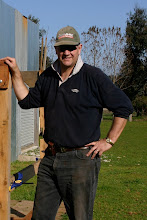S
One of the first things I did when I got back was to spray around the yard with some glyphosate that was already mixed and in the 100 litre sprayer.
For those that don't know, glyphosate is a broad spectrum systemic herbicide. It is closely established, in most peoples' minds, with chemical company Monsanto. They were the holders of the original patent and, since the patent expired, have made it a key component of their move into genetically engineered crops. The main feature of Monsanto's genetically engineered seeds seems to be that they are 'Roundup Ready' - that is capable of living through the application of glyphosate that kills everything else.
I remember a friend who worked for Monsanto back in the early 1980s telling me that Roundup (Monsanto's brand name for glyphosate) was so safe you could drink it. I'm not sure that was an approved company view, but he had picked it up somewhere - and the reality seems to be that it was less dangerous than many other chemicals in common use at the time (or now for that matter).
I've been a modest user of glyphosate for many years - basically for its capacity to help me keep things tidy. It does, over the course of a week or two, kill almost anything green - and with limited residual effects. It makes broad scale weeding easy - and I'm not convinced that any downsides from my limited use of it are sufficient to outweigh that benefit.
I wouldn't apply the same logic to wider use of it - or, particularly, to its use in conjunction with genetic engineering. That seems to me to be pretty risky.
I have another organic weak point when it comes to woody weeds like gorse and blackberry. My last two properties have had long established infestations - over big areas. I've used (and continue to use) much more potent chemicals than glyphosate to help with controlling regrowth of these weeds. I guess I'd rather not, but an infestation of gorse that is left for a few years (let alone a few decades) creates a seed bank that lasts (it is said) for 20 years.
This seed bank means that, having got rid of it, you need to keep dealing with regrowth (from seed) for 20 years - and never allow anything to flower and set more seed. A couple of hours and a couple of tanks of Grazon spray once a year means that, by 2025, Moora will be free of gorse. As of today, we're only 5 years into the program - and to remove it any other way would still take days - rather than hours. Perhaps, in another few years, the level of effort will allow manual grubbing, but, for me, not yet.
So I guess I won't be becoming certified organic any time soon. I don't like chemicals, I think they are bloody dangerous, I think I should be more careful with their use than I am, and I'll continue to search for better alternatives ... but I'm not willing to exclude the possibility of using all chemicals - where the payoff for use is still so substantial.
I also have a philosophic objection to the whole idea and process of organic certification - but that's another story.
S
Tuesday, May 4, 2010
Subscribe to:
Post Comments (Atom)




No comments:
Post a Comment